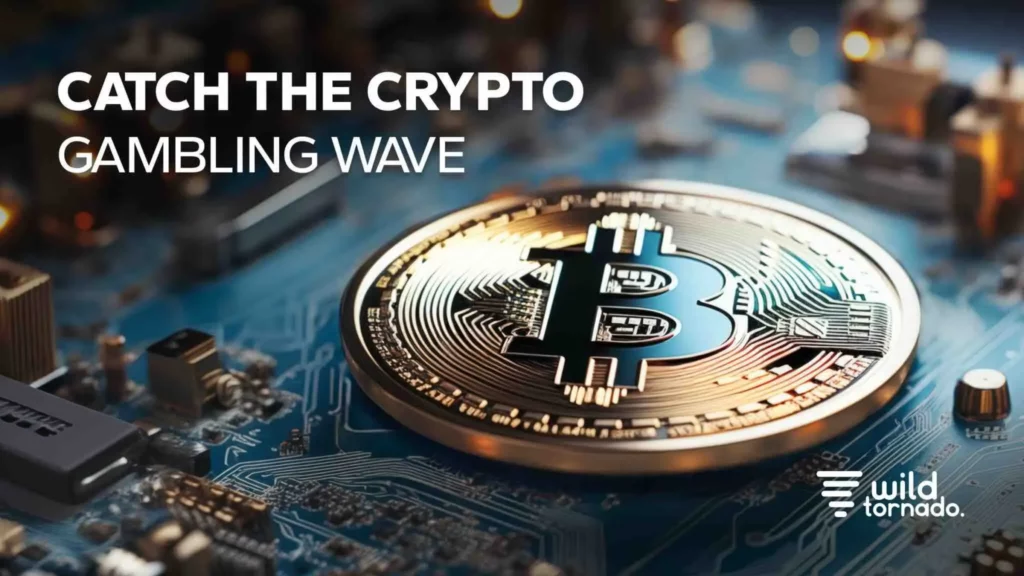
A web3 casino operates on blockchain technology and smart contracts, eliminating centralized control over gambling operations. Every transaction—from depositing funds to determining bet outcomes—runs through automated, transparent processes that remove third-party interference and ensure maximum fairness in blockchain gambling platforms. The building of these platforms focuses on improving user experience, leveraging onchain infrastructure, and incorporating innovative features that set them apart from older models.
Unlike traditional online casinos that rely on centralized operations, fiat currencies, and established regulatory frameworks, and unlike traditional casinos that use established payment systems and maintain strict control, web3 casinos offer enhanced transparency, security, and player control through decentralized networks. Web3 casinos intend to introduce innovative features and positively shape the future of the online gambling industry.
Introduction to Web3 Casinos
Web3 casinos represent a groundbreaking shift in the online gambling landscape, harnessing the power of blockchain technology and smart contracts to deliver a transparent, secure, and fair gaming environment. Unlike traditional online casinos, these platforms operate on decentralized networks, giving users greater control over their assets and transactions.
Every operation within a Web3 casino is transparent, allowing players to verify the fairness of games and outcomes directly through smart contracts. This new era of online casinos is set to redefine the industry, providing players with a level of trust and security that was previously unattainable.
By leveraging advanced technology, Web3 casinos provide a gaming experience where fairness and decentralization are at the forefront, ensuring that every transaction and game result can be independently verified by users.
What Makes Web3 Casinos Different?
Web3 casinos represent a revolutionary shift in online gambling, harnessing blockchain technology and smart contracts to create transparent and fair gaming environments. As a new form of online casino, these platforms operate on decentralized networks, giving players unprecedented flexibility and control over their gaming experience.
Blockchain technology ensures all transactions are fast, secure, and transparent, providing high levels of trust for users. Players enjoy seamless cryptocurrency deposits and withdrawals while benefiting from enhanced anonymity. Web3 casino platforms also deliver exciting action and immersive gameplay features, making them an attractive choice for those seeking privacy, efficiency, and engaging entertainment in their gambling activities.
Types of Web3 Casinos
The Web3 casino ecosystem is diverse, offering several types of platforms that cater to different player preferences and gaming styles. Among the most popular are decentralized finance (DeFi) casinos, which use smart contracts to automate game logic and payouts, ensuring a transparent and fair experience for all players.
NFT-powered casinos introduce a new way to wager, allowing users to use unique digital assets as collateral or in-game items, adding an interesting layer of ownership and strategy to the gaming experience.
Metaverse casinos take things a step further by providing immersive virtual environments where players can interact with each other and the casino in real time, creating a social and engaging atmosphere. Each of these types of Web3 casinos provides a unique set of features, leveraging technology to offer new ways to play, wager, and connect, making the market more dynamic and accessible than ever before.
Key Advantages of Web3 Gambling
Web3 casinos are built around transparency and decentralization principles. Players can review smart contract operations and, in many cases, participate in platform governance through DAOs (Decentralized Autonomous Organizations). These platforms deliver user-friendly experiences that work seamlessly across desktop and mobile devices. Additionally, players can hold their cryptocurrency funds in self-custodial wallets, giving them greater flexibility and security.
Transparent sharing of operational information, including smart contract details and platform data, builds trust and verifies the legitimacy of web3 casinos. This approach gives users more control and creates stronger trust and ownership in the crypto gambling ecosystem, attracting a growing number of people who participate in web3 gambling and contributing to increased user engagement.
DAO Governance Systems
Some decentralized casinos allow token holders to vote on platform decisions, including rule changes, new blockchain games, or crypto bonus systems. Players become active contributors to the ecosystem rather than passive users. This participatory model drives engagement and makes platforms feel truly community-driven and decentralized.
Leading platforms in the decentralized gambling market openly share development roadmaps and outline clear strategies for integrating new features and technologies. By communicating their vision, these platforms position themselves as industry leaders and build trust within their communities.
Getting Started with Web3 Casinos
Starting your journey with Web3 casinos is straightforward, but it does require some basic understanding of blockchain technology and digital assets. First, players need to set up a digital wallet—such as MetaMask—to securely store and manage their cryptocurrencies. After acquiring coins like Ethereum or Bitcoin, users can choose a Web3 casino that suits their preferences and create an account, typically using an email address and password.
Some casinos may require users to complete a verification process, which could involve submitting identification documents and proof of address to comply with security and regulatory requirements. Before proceeding, it’s essential to read the casino’s terms and conditions, understand the rules, and ensure you are comfortable with the platform’s technology and operations. By following these steps, players can confidently set up their accounts and start enjoying the innovative world of Web3 casino gaming.
Comparison with Traditional Online Casinos
While traditional online casinos dominate the market, they often lack transparency and fairness. These platforms handle a lot of gambling activities and process billions of dollars in transaction volumes, highlighting the massive scale of the industry. In conventional platforms, game outcomes are controlled by central authorities, making it difficult for players to verify result integrity. Web3 casinos, however, leverage smart contracts to guarantee fairness and allow players to independently verify every outcome.
This transparency level is rarely found in traditional online casinos. Additionally, decentralized platforms offer broader selections of games and betting markets, catering to diverse player preferences. Regulation and security also differ significantly, as each state and Europe have their own frameworks for legalizing and overseeing online gambling, impacting licensing and operational clarity. The decentralization of player data and operations also enhances security, making web3 casinos safer and more reliable options for online gambling enthusiasts.
Casino Games and Betting Options
Web3 casinos provide access to extensive varieties of casino games, from classic slots and poker to roulette, innovative new offerings, and even the option to buy lottery tickets with cryptocurrency. Sports betting markets are also major features, allowing users to wager on popular events like football, basketball, and tennis. The gaming experience and interface are enhanced with engaging images and visuals. Users can easily click to register, deposit funds, or navigate the platform, making it user-friendly. Players can also purchase their preferred coin or cryptocurrency for gameplay, with support for various coins and meme coins.
Smart contracts ensure every game and bet executes transparently, with players easily verifying each round’s outcome. Many decentralized casinos offer attractive rewards, including welcome bonuses and loyalty programs, giving players additional reasons to engage. To unlock the full value of these bonuses, players often need to reach specific wagering requirements within a set timeframe. Cryptocurrency integration makes it simple to deposit, withdraw, and manage funds, ensuring seamless and convenient experiences for all users.
Popular Web3 Casino Projects
Well-known blockchain gambling platforms include Edgeless, FunFair, DAO.Casino, and Chiliz. Each platform is backed by reputable companies playing significant roles in online gaming and slots development, driving innovation and shaping market trends. These companies are recognized for developing innovative game mechanics or delivering popular titles that have established their credibility and expertise in the market. These companies build advanced web3 casino platforms with seamless blockchain integration and enhanced user experiences.
These platforms use proprietary casino crypto tokens, allowing users to purchase tokens or use various coins, including meme coins like Dogecoin, Shiba Inu, or Pepe, to participate in games and betting. To further simplify cross-chain transactions and enhance user experience, many platforms are integrating bridge solutions that facilitate onboarding for users unfamiliar with different blockchains and wallets. The platforms focus on strong branding with distinctive designs and user-friendly app interfaces to build trust and recognition among players.
Many are integrating NFT gambling mechanics and meta-gaming features, evolving the online crypto casino experience into broader Web3 digital gambling ecosystems. When choosing a web3 casino platform, keep in mind the importance of licensing and regulatory standards to ensure trust and legitimacy.
Security and Legitimacy of Web3 Casinos
Ensuring the security and legitimacy of a Web3 casino is crucial for every user. These platforms rely on smart contracts to govern game logic and payouts, making every outcome transparent and verifiable. Advanced security measures, such as encryption and two-factor authentication, are implemented to protect user data and prevent unauthorized access.
Players should always verify the legitimacy of a Web3 casino by checking for valid licenses, reading reviews from other users, and researching the casino’s reputation for fair payouts and transparent operations. It’s essential to check that the platform has a strong track record of protecting user data and honoring winnings. By taking these steps, players can enjoy a secure and trustworthy gaming experience, knowing that their information and funds are well-protected.

Web3 Casino Payments
Web3 casino payments are designed for maximum ease, speed, and transparency, thanks to the underlying blockchain technology. Players can deposit and withdraw funds using a variety of cryptocurrencies, such as Bitcoin, Ethereum, and Litecoin, with transactions typically processed instantly and visible on the blockchain for full transparency.
Many Web3 casinos also offer flexible payment options, including credit cards, e-wallets, and even bank transfers, catering to a wide range of user preferences. Before making a withdrawal, some casinos may require players to complete a verification process to ensure security and compliance, which might involve submitting identification documents.
The use of smart contracts guarantees that all payments are secure and transparent, allowing players to verify their transaction history at any time. With these streamlined and flexible payment systems, Web3 casinos provide a seamless and user-friendly experience for all players.
Legal Status and Regulation
The legal status and regulation of web3 casinos remain evolving as authorities worldwide work to keep pace with rapidly advancing technology. Despite this uncertainty, many decentralized casinos are committed to operating transparently and fairly, often seeking licenses and adhering to anti-money laundering protocols.
For players, verifying casino legitimacy before playing is essential. This means checking licenses, reading user reviews, and addressing any concerns that may arise. By taking these steps, players can protect themselves and ensure safe, enjoyable online gambling experiences in this new era of blockchain-powered casinos.
If you have any question about the legal status or legitimacy of a web3 casino, consult the FAQ section or reach out to customer support for prompt assistance.
Current Challenges and Future Solutions
Despite their potential, web3 casinos face several hurdles: slow transaction times on some gambling blockchains, complex user interfaces, and high gas fees, especially on networks like Ethereum. Many platforms require users to set up wallets and use bridges to transfer assets across different blockchains, which can intimidate new users and create onboarding friction.
Verification processes, such as confirming user identity for security and compliance, can add complexity, though some platforms are working to streamline these procedures. Additionally, crypto gambling regulations remain unclear in many regions, highlighting the need for regulatory clarity to support the growth and acceptance of decentralized gambling platforms.
Ongoing efforts to improve user experience and platform features, such as making it easier for players to meet bonus or wagering requirements within reasonable timeframes, are helping address these challenges. With the rise of Layer 2 scaling solutions and expanding web3 casino adoption, these obstacles may soon be overcome, paving the way for broader mainstream acceptance of decentralized gambling platforms.





